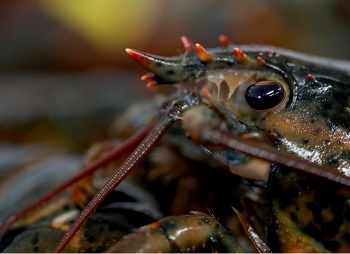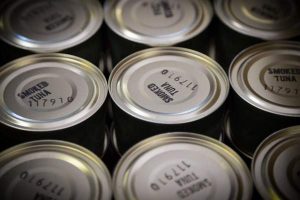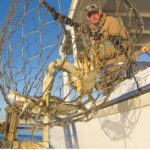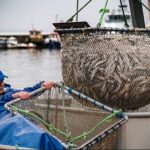Tag Archives: Sipekne’katik First Nation
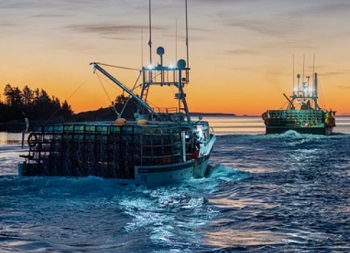
‘There’s Death Threats’: Indigenous Fishers Nervous as Nova Scotia’s Commercial Lobster Season Opens
Some Mi’kmaq have fished alongside commercial fishermen on these wharves for years but this year, after violence erupted in the past few months, they’re now divided largely by race—the white Acadian fishermen at Meteghan, and the Mi’kmaq at Saulnierville, with each flying their own flags. A court injunction, sought by the Mi’kmaq, has further separated the two groups, in an effort to prevent any more aggression and harassment towards band members on the Saulnierville wharf and on the water as they continue to fish until Dec. 17, the end of their moderate livelihood plan. The commercial inshore lobster fishery, expected to launch later this week, runs until the end of May. >click to read< 20:37
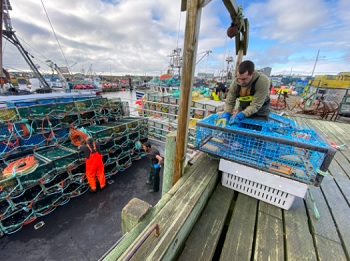
LFA 33 to open, Monday a no-go for LFA 34: weather forecast leads to split start of commercial lobster season
The fishery in Lobster Fishing Area (LFA) 33, which runs along the province’s south shore will open as scheduled on Monday, with boats leaving at 7 a.m. But that’s not the case for LFA 34 off southwestern Nova Scotia, which, following days of fine weather over the weekend, won’t see boats heading out for dumping day on the traditional last Monday of November. With boats loaded with traps and gear for the start of the season, two industry and stakeholder conference calls held over the weekend,,, “The lobster fishery is vital to our region and our province, and there is a very real anxiety among our community members that this important economic driver is in jeopardy, >click to read< 15:30

Sipekne’katik First Nation receives proposed moderate livelihood fishery memorandum of understanding from feds
Federal Fisheries Minister Bernadette Jordan has sent a proposed memorandum of understanding to the Sipekne’katik First Nation regarding its moderate livelihood fishery. The band says the draft MOU is being reviewed by its lawyers before it will be shared with the public. The only detail made available so far is that it includes an acknowledgement of the band’s right to sell its catch. “This agreement has the potential to be a historic recognition of our treaty rights,,, Sipekne’katik Chief Michael Sack said in a news release Sunday morning. >click to read< 10:29

Replenishment, or Misguided Retribution?! Trouble brewing ahead of start to Nova Scotia fall lobster season
The recent seizure of lobster traps in St. Marys Bay by federal officials could lead to big trouble on the water. Chief Mike Sack of the Sipekne’katik First Nation says Indigenous fishers whose traps were taken last weekend and on Wednesday will replace them by taking the traps of commercial fishers when the fall season opens Monday in southwestern Nova Scotia, a huge event known as Dumping Day. “Dumping Day is going to be about 400,000 traps that our people get to pick from to replenish our traps,” Sack said in an interview, referring to the start of Canada’s largest and most lucrative lobster fishery. >video, click to read< 08:02
 Tension could rise again on Monday in lobster dispute on east coast – The ongoing dispute between Indigenous and non-native lobster fishers could get tense once again. Last weekend, and on Wednesday, agents from Fisheries and Oceans Canada (DFO) seized hundreds of Indigenous lobster traps, ostensibly because the traps were set before the season opens on Monday.. >click to read<
Tension could rise again on Monday in lobster dispute on east coast – The ongoing dispute between Indigenous and non-native lobster fishers could get tense once again. Last weekend, and on Wednesday, agents from Fisheries and Oceans Canada (DFO) seized hundreds of Indigenous lobster traps, ostensibly because the traps were set before the season opens on Monday.. >click to read<

DFO officers seize 500 lobster traps in St. Marys Bay
The Department of Fisheries and Oceans says enforcement officers are going back to St. Marys Bay in southwestern Nova Scotia where they seized hundreds of lobster traps on the weekend in an area used by Mi’kmaw fishermen. Todd Somerville, DFO’s director of conservation and protection for the Maritimes, said 500 traps were seized for a variety of violations. “Untagged gear, improperly configured gear, gear that hadn’t been tended in a while. There was gear where dead lobsters were found. Over 6,000 lobsters, live lobsters, were returned,,, >click to read< 18:17

Sipekne’katik says their livelihood fishery has brought in 100,000 pounds of lobster
Sipekne’katik First Nation said Wednesday they have caught just under 100,000 pounds of lobster since the fishery launched Sept.17, according to their compliance officers. That’s about 45 metric tonnes. “The amount of lobster we took out so far is equivalent to one [commercial] licence,” said Chief Mike Sack. He said the suggestion there has been any over-fishing through the Mi’kmaw treaty fishery is not only inaccurate, but it is fueling discussions that will lead to added marginalization and conflict against the Mi’kmaq. Commercial fishermen have objected to the fishery on conservation grounds, since it is outside the regular lobster season. >click to read< 14:53
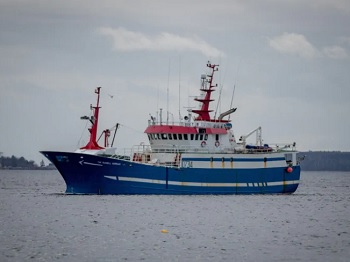
“There’s something awful fishy going on here”: What about Clearwater and the offshore lobster fishery?
Media attention is trained on St. Mary’s Bay in southwest Nova Scotia, where the Sipekne’katik First Nation led by Chief Michael Sack has been exercising Treaty rights to a “moderate livelihood” fishery since September 17. But what is happening in the offshore lobster fishery is going largely unnoticed. That is absolutely understandable, given the very ugly scenes that erupted,,, But what is happening in the offshore could also have wide-reaching impacts on the Atlantic lobster fishery and independent inshore fishers, and is also worth keeping an eye on.,, Just nine days before Sipekne’katik fishers took to the waters, Membertou First Nation and Clearwater Seafoods announced that they had “reached an agreement for the sale of two of Clearwater’s eight offshore lobster licences” to Membertou. >click to read< 19:52
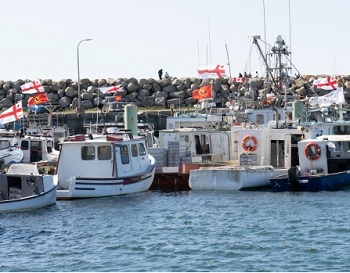
N.S. Mi’kmaq chiefs demand stop of alleged federal plans to seize lobster traps
A group of Nova Scotia Indigenous leaders has levelled harassment allegations at the federal government over an ongoing moderate livelihood fishery dispute,,, The Assembly of Nova Scotia Mi’kmaq Chiefs issued a statement on Friday saying they’d learned of unspecified plans from the conservation and protection department of Fisheries and Oceans Canada, but did not disclose the source of their information. The chiefs alleged department members may be planning to seize gear and traps belonging to fishers exercising what they describe as a protected right to earn a moderate livelihood from their efforts. >click to read< 10:23
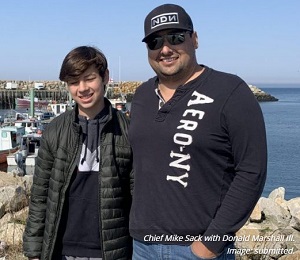
Sipekne’katik Chief Threatening To Disrupt Commercial Lobster Fishery This Year
“If they can interfere with our fisheries, we’re going to start rallying up and blocking all of their wharves,”,, Sack says that on October 30, he spoke with a regional director of fisheries management for DFO. The director, according to Sack, informed the Chief that any untagged Mi’kmaq lobster traps would be confiscated. Commercial fishermen are claiming, however, that the Band has increased its fishing in the lobster breeding ground in recent days. On October 29, in a letter to Bernadette Jordan, several fishermen’s groups claimed the federal government is doing nothing to stop the unregulated fishery. >click to read< 11:36
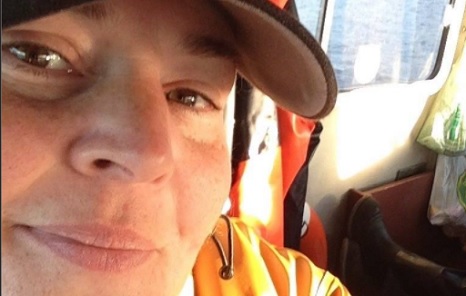
Envelope pushed in St. Marys Bay and Digby folk pushed into a corner – Susan Beaton
So now that the dust is starting to settle, righteous keyboard warriors can take a breather. So let’s try to give the people of Digby County and St. Marys Bay some consideration. Terrible things were said and done this month to the Sipekne’katik First Nation people and to those who supported them. No apologies here for the bad behaviour. But consider for a moment what it’s like for a small village, its lifeblood on the line, as a fight for treaty rights plays out on its doorstep. Sipekne’katik wanted to push to the forefront the “moderate livelihood” debate, as many bands in other areas are doing as well. This tiny bay became a focus of that effort. What happened next is a bit more dubious. By Susan Beaton, >click to read< 09:23

RCMP release persons of interest photos and video in Nova Scotia lobster pound arson investigation
Near midnight on Oct. 16 and into the early morning hours of Oct. 17 the Yarmouth County RCMP and numerous fire departments responded to a fire at the pound. The building, which was unoccupied, was destroyed. “The investigation has determined the fire to be suspicious,” reads an Oct. 30 RCMP media release.,, In an initial media release the RCMP distributed on Oct. 17, the police said a man was is in hospital with life threatening injuries believed related to the fire. He had also been referred to as a person of interest. >video, photos, click to read< 14:59
Nova Scotia lobster pound fire called suspicious – man in hospital with life-threatening injuries >click to read<

Membertou First Nation Chief Paul leaves Assembly of Mi’kmaq Chiefs in split over moderate livelihood
Chief Terry Paul has stepped down from the Assembly of Nova Scotia Mi’kmaq Chiefs due to a disagreement over how moderate livelihood negotiations are being conducted. Paul, who is chief of Membertou First Nation in Cape Breton, had served as the fisheries lead for the assembly’s negotiation arm called the Kwilmu’kw Maw-klusuaqn Mi’kmaq Rights Initiative (KMKNO). Negotiations fell apart last week between that body and Fisheries and Oceans Canada over the implementation of a moderate livelihood fishery by the Mi’kmaw. Paul said Wednesday that the KMKNO is not adequately representing all of the province’s first nations. “I feel that not all the communities are being treated the same way,” >click to read< 13:34
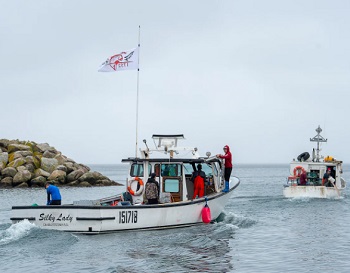
For Acadian fisherman, early Mi’kmaq fishery in N.S. bay can ‘never’ be respected
As he stands calmly splicing anchor rope, Roger LeBlanc describes the anxiety, anger and suspicion over a Mi’kmaq lobster fishery that is coursing through his small Acadian community. The threat perceived by LeBlanc, 61, is the launch of a lobster fishery by Sipekne’katik First Nation in September,,, In the weeks that followed, Indigenous traps were cut, a boat burned, vehicles were destroyed, and one lobster pound that handles Indigenous catch was damaged while another was burned down. The actions by groups of up to 200 people have drawn condemnation from across party lines in Parliament. >click to read< 13:40
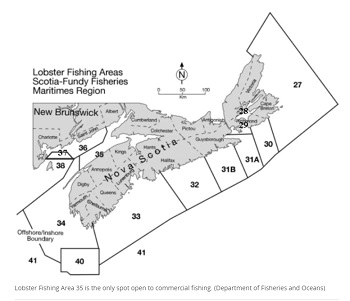
Company willing to buy Sipekne’katik lobster from open fishing area 35
Bruce Gidney of Gidney Fisheries in Digby made the offer in response to Chief Mike Sack of Sipekne’katik, who has said buyers and suppliers won’t do business with the band amid ongoing tensions between Mi’kmaw and non-Indigenous commercial fishers. “The chief said no one was interested,” said Gidney. “We weren’t contacted and neither were other buyers I’ve talked to.” The Sipekne’katik band is sitting on 6,800 kilograms of lobster harvested by members under three commercial licences it holds in Lobster Fishing Area 35, or LFA 35. The commercial season opened there last week. It is the only area currently open to commercial fishing. >click to read< 08:45
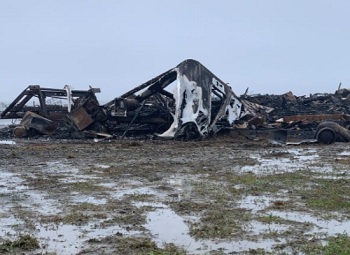
Nova Scotia lobster pound fire called suspicious – man in hospital with life-threatening injuries
A fire that police are calling suspicious destroyed a lobster pound in Middle West Pubnico, N.S., early Saturday. The blaze broke out at one of two facilities raided and vandalized by commercial fishermen in southwest Nova Scotia earlier this week protesting the “moderate livelihood” fishery launched by Sipekne’katik First Nation last month. Mi’kmaw fishers were storing their catches at the facilities. Tensions have been simmering for weeks in the province’s southwest, sparked by the launch of a moderate livelihood lobster fishery by the Sipekne’katik band outside the federally mandated commercial season — 21 years after the Supreme Court of Canada ruled in the case of Donald Marshall Jr. >click to read< 18:36
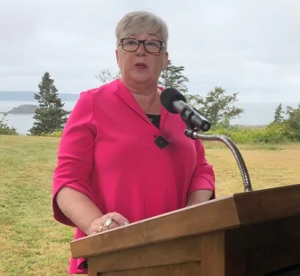
Lobster crisis. Is anyone at the helm?
Clearly, Fisheries Minister Bernadette Jordan doesn’t suffer from NIMBY syndrome (Not In My Backyard). How do we know? Because she’s allowed fisheries tensions to escalate,,, To be fair, the issue has simmered for decades. A 1999 Supreme Court of Canada decision reaffirmed the treaty rights of Nova Scotia’s Mi’kmaw communities to a moderate livelihood fishery. Tempers have flared occasionally over the years, and none of Jordan’s predecessors had the courage to create an industry where the moderate livelihood fishery happened without opposition from commercial fishers. The minister needs to show leadership before someone gets seriously hurt, or worse. >click to read< 12:19
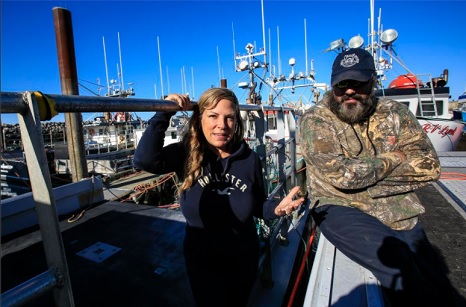
He had hoped to help end Nova Scotia fishery tensions, but now this union leader feels he just has to step down
It’s an ebb tide; in the afternoon sun in the Acadian fishing village of Meteghan, the Salt Shaker hangs low on the wharf. It seems appropriate. Comeau’s resignation has scuttled one of the few potential bright spots in a tumultuous week in southwestern Nova Scotia’s lobster fishery conflict; the hope that talks between him and Sipekne’katik chief, Mike Sack, might be the first steps towards a solution to the battle between Indigenous and non-Indigenous fishers.“ Now, the planned talks are dead, and the conflict that has torn the fishing community apart has no end in sight. >click to read< 08:18
 N.S. fishermen’s union head quits, says lobster dispute is ‘too much of a toll’ on his family – Joel Comeau says it’s no longer safe for him to be the president of the Maritime Fishermen’s Union Local 9 in Nova Scotia. Comeau stepped down Friday ahead of a planned meeting with Sipekne’katik First Nation Chief Mike Sack to discuss the increasingly tense dispute between commercial and Mi’kmaw lobster fishermen in the province. >click to read< 10:44
N.S. fishermen’s union head quits, says lobster dispute is ‘too much of a toll’ on his family – Joel Comeau says it’s no longer safe for him to be the president of the Maritime Fishermen’s Union Local 9 in Nova Scotia. Comeau stepped down Friday ahead of a planned meeting with Sipekne’katik First Nation Chief Mike Sack to discuss the increasingly tense dispute between commercial and Mi’kmaw lobster fishermen in the province. >click to read< 10:44

Trudeau defends federal response as threats escalate over Mi’kmaw fishery in Nova Scotia
“We are expecting the RCMP and police services to do their jobs and keep people safe,” Trudeau said. On Thursday, the chief of the Sipekne’katik First Nation urged Trudeau to step in and make sure those involved in the violence are prosecuted. The vice-president of a fishermen’s union in Nova Scotia has stepped down, citing fears for his family’s safety as threats from some non-Indigenous fishermen opposed to a self-regulated Mi’kmaw lobster fishery continue to escalate. Joel Comeau, a former member of the Local 9 of the Maritime Fishermen’s Union, was supposed to meet with Sack on Friday morning but abruptly cancelled the meeting. Comeau said he’s received “a lot of flak from my people and a lot of intimidation” over his willingness to work with Sack to find a way forward. “This community is out of hand. This community feels unsafe,” said Comeau. >click to read< 16:00

Angry mob trap Mi’kmaw fishermen at a lobster pound in southwestern Nova Scotia
An angry mob of non-Indigenous lobster fishermen trapped two Mi’kmaw fishermen inside a lobster pound in southwestern Nova Scotia late Tuesday evening. According to Jason Marr, a Mi’kmaw lobster fisherman with the Sipekne’katik First Nation, N.S., the angry crowd also set fire to his van and threw rocks at the facility’s windows in West Pubnico while he and another fisherman, Randy Sack, were trapped inside. Marr said he fled to the lobster pound in West Pubnico Tuesday evening when he heard that a mob of non-Indigenous fishermen were heading to the wharf,,, >click to read< 09:30

Mi’kmaq push for legal lobster sales for non-Indigenous buyers
The Mi’kmaw community in Nova Scotia that recently launched its first self-regulated lobster fishery is now pushing the province to change laws restricting non-Indigenous fish buyers from doing business with the First Nation. Sipekne’katik First Nation introduced its Trade and Transport regulations today for Mi’kmaw fishers to legally sell seafood harvested under the right-based fishery to Mi’kmaw and non-Indigenous consumers and seafood wholesalers.,, While Sipekne’katik is willing to work with seafood buyers from the existing commercial fishing industry, Sack said, until an agreement is reached with governments, there are few places for Mi’kmaq to sell their lobster. >click to read< 19:59
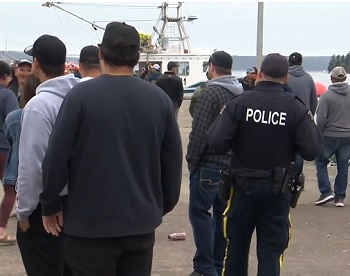
Sipekne’katik First Nation to meet with Minister Bernadette Jordan next week
After multiple calls to meet with the Department of Fisheries and Oceans, members of the Sipekne’katik First Nation will sit down with Fisheries Minister Bernadette Jordan next week. Chief Michael Sack tells Global News the details of the meeting, to be held amid an ongoing dispute between Indigenous and non-Indigenous fishers, are still in the works, but he says it will be held virtually as Jordan is returning from Ottawa and will need to self-isolate for 14 days upon her arrival. video, >click to read< 19:11

Nova Scotia Commercial fishermen turn focus to alleged buyer in Mi’kmaw lobster dispute
Commercial fishermen in southwestern Nova Scotia say they are taking a different approach on Monday in the dispute around the new self-regulated lobster fishery launched by Sipekne’katik First Nation. After several days of hauling in traps belonging to the Mi’kmaw fishers, the commercial fishermen now say they are turning their attention toward those who they believe are buying Mi’kmaw-harvested lobster. “It’s with the federal government and it’s with people from within our own community who are facilitating the buying of illegal fishery products.” A large crowd gathered in protest Monday morning in front of an alleged buyer’s home in the community of Comeauville. >click to read< 13:49
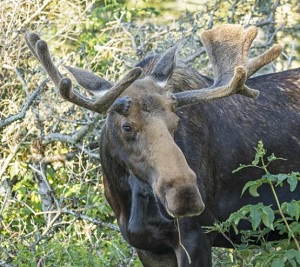
Fishing dispute could close Cape Breton moose hunt
“Our people are angry,” said Rod Googoo, the chief of the Waycobah First Nation,,, Googoo was among hundreds of Mi’kmaq who spent part of the weekend in Saulnierville, a small fishing port located between Digby and Yarmouth on the province’s southwestern coast. They were there to support to fishers from central Nova Scotia’s Sipekne’katik First Nation who took to the water last week after being issued lobster fishing licenses by their own band.,, The Waycobah chief, who is a key part of the Assembly of Nova Scotia Mi’kmaw Chiefs’ lands, wildlife and forestry involvement, went to social media with the suggestion that his people shut down this year’s moose hunt in Cape Breton. The idea was met with overwhelming support and encouragement. >click to read< 12:27
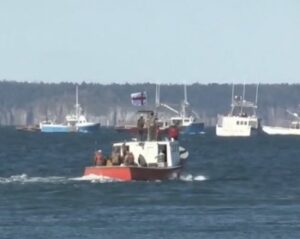
Nova Scotia Indigenous fishermen not backing down after traps removed
Indigenous and non-Indigenous fishermen have been locked in an ongoing dispute. Both sides say things were heated on the water on Sunday. “A Mi’kmaw fishermen went out to check his gear, and he was swarmed by commercial fishing vessels that were cutting him off and hauling their gear, stealing their traps – preventing our people from fishing,” says Sipekne’Katik First Nation Chief Michael Sack. “One of our boats was chased by a First Nations vessel, and they made an attempt to ram him and to board him,” says Sproul. “He immediately turned around and retreated here to Meteghan.” Sack says, while having their gear hauled up by commercial fishermen slows their operation a bit, they are in it for the long haul – with no plans to stop fishing. >video, click to read< 08:35
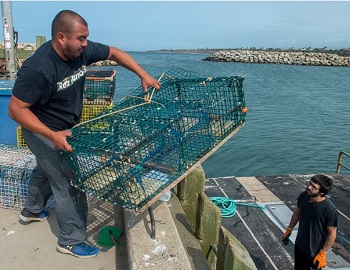
Fishermen say they are removing Indigenous lobster traps in western Nova Scotia
Non-Indigenous fishermen say they are in the process of removing lobster traps set by fishermen from the Sipekne’katik First Nation in waters off western Nova Scotia. Colin Sproul, of the Fundy Inshore Fishermen’s Association, says a large number of boats are in St. Marys Bay and intend to remove the traps and take them to the wharf in Meteghan, N.S. Sproul says the fishermen are taking action on what they believe is an illegal out-of-season fishery because the Department of Fisheries and Oceans has refused to do so. But the Sipekne’katik First Nation says its people have a treaty right to fish at any time. ,, A clarification was issued by the court, which said the treaty right was subject to federal regulation. >click to read< 13:15
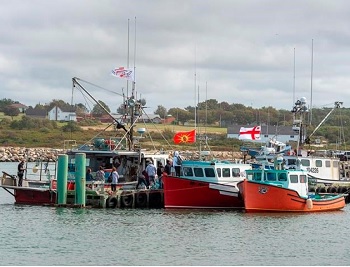
Lobster protests: Nova Scotia RCMP arrest two at wharf in Weymouth
RCMP say two people were arrested Friday and accused of assault at a wharf in western Nova Scotia, where there were reports of ugly confrontations over a First Nation’s commercial lobster fishing operation. Some non-Indigenous fishermen say they believe the Indigenous business is illegal because the regular fishing season is now closed, but the Sipekne’katik First Nation says their people have a treaty right to fish at any time. The Mounties say no one was injured at the wharf in Weymouth, and the two suspects were arrested and escorted from the scene. >click to read< 15:16

Sipekne’katik First Nation issuing own lobster licences
After a blessing of its fleet on Thursday morning, the Sipekne’katik First Nation will issue lobster fishing licences at the Saulnierville wharf. On Tuesday, the Potlotek First Nation in Cape Breton sent its plan to begin a rights-based moderate livelihood lobster fishery on Oct. 1 to federal Fisheries Minister Bernadette Jordan. They weren’t asking her permission, but rather for her to consult them on what they intend to do. “We’re tired of waiting and we’re tired of being poor,” Potlotek chief Wilbert Marshall said on Wednesday. >click to read< 08:26
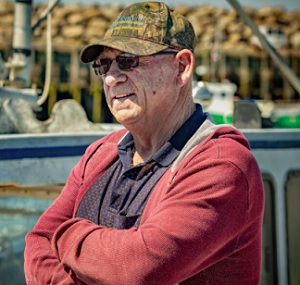
Mi’kmaw lobster harvesters feeling harassed for practising moderate livelihood fishery
Mi’kmaw lobster harvesters in southwestern Nova Scotia say they feel harassed by non-Indigenous harvesters for practicing their treaty right to earning a moderate livelihood by setting lobster traps in St. Mary’s Bay. The harvesters say the harassment isn’t only coming from non-Indigenous harvesters. They’ve also had their gear seized by officers with the Department of Fisheries and Oceans. >click to read< 08:14






